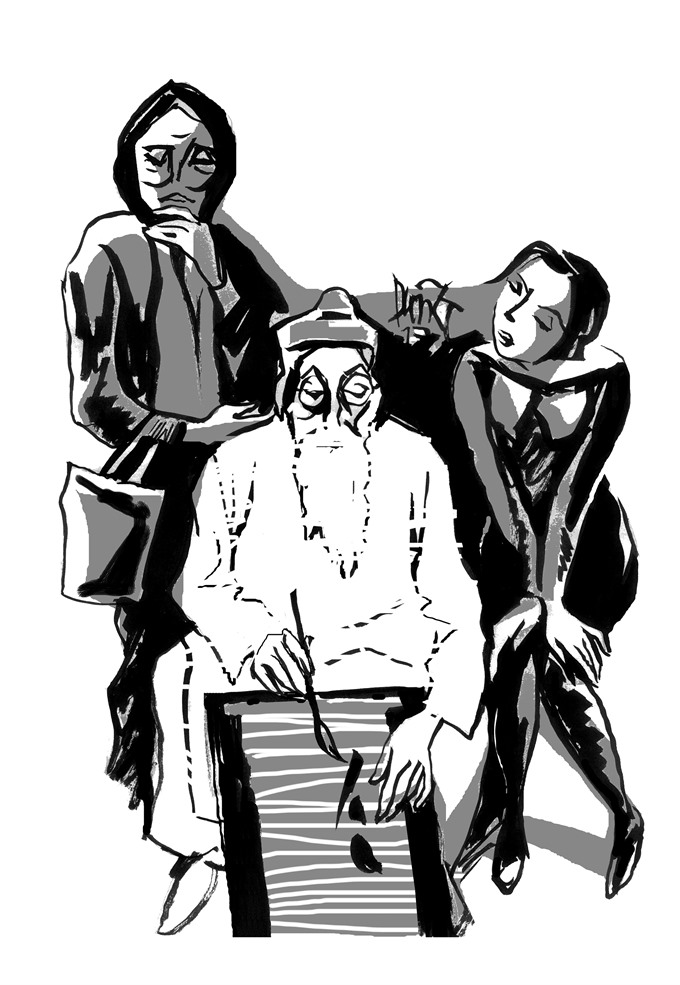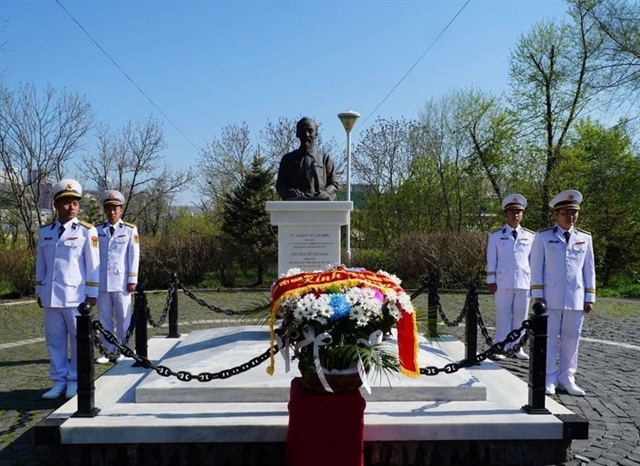

A short story by Bão Vũ
 |
| Illustration by Đỗ Dũng |
by Bão Vũ
Gone was the noted scholar’s day!
Where does his soul now stay?
(from Vũ Đình Liên’s poem Ông Đồ (Scholar)
“Did anyone come to visit me when I was out, dear granny?” Nga said to her grandmother Ngân then took off her blouse and skirt before throwing them onto the armchair.
“Yes, of course! A young man did, he was polite and serious,” replied the old woman.
“You only pay attention to human nature. What did he look like: tall or short, handsome or unkempt?”
“How silly! If you judge a man’s outward appearance, you’ll lead a miserable life.”
Jumping onto her granny’s bed in her underwear, Nga hugged her tightly. “I think otherwise, granny. If I marry a serious but penniless guy, won’t I be poor my whole life? Anyway, why do you think that he looked serious?”
“Because he was handsome. What’s more, he came here on an expensive motorbike.”
“Handsome with a motorbike, that’s okay,” she mumbled. “What kind of vehicle was it? A Wave or a Lead?”
“Don’t be daft, how should I know? He behaved properly. He didn’t honk his horn, nor did he flash his lights. Also, his voice sounded sweet and soft.”
“What did you do then?”
“I gave him the key to open the door for me and said, ‘Just wait for Nga, will you?’ ‘Thank you very much, madam,’ he stammered. To my surprise, he stayed outside! Clearly, he was a good man.”
“Oh dear, nowadays, thieves are very cunning!” Nga screamed. “The guy refused to come in to fool you, that’s all. That’s a trick called ‘diamond cut diamond,’ you see. You should act very carefully in future, granny.”
“Oh, sorry! I remember now! He told me his name was Hoàng, one of your ex-classmates.”
“Aha, Hoàng the crazy guy!” Nga giggled with delight. “He’s my ex-lover. What’s the term you used to call such a man, granny? Hmm, ‘an old flame’, it seems! But I’m sure the motorbike wasn’t his as he’s been living on the outskirts of the High Plateau.”
“Quite right! He told me that he’s a sailor on a northbound trip to deliver goods to customers. He called on you to see an old chum,” she said to Nga.
“Well, how deeply moved I am! Previously, he was in love with me. But I was unable to go further because his family lived in a dilapidated shanty in a remote corner of the woodland. Love is not all you need, you see, granny.”
“How can you say that? Girls must speak softly and be cautious in their words,” she scolded Nga. “Put on a warm gown before going to sleep or else you’ll catch a cold.” However, Nga had already fallen asleep.
* * *
It was late at night. Ngân sank into a broken sleep due to her old age, in spite of the din of the traffic. Nga suddenly jumped out of bed and woke her grandmother. The old woman stared at her granddaughter’s well-shaped body which clung to her thin nighty.
Nga drank a whole glass of warm water at a gulp.
“That’s not the right way to drink,” Ngân told her.
“What good eyesight you’ve got!” said Nga. Again, she hugged her tightly, whispering, “After I get married, you’ll be alone. Does that make you sad?”
“You naughty kid! I only tell you off because I love you.”
“So you understand love too. Did you love your husband? I’ve been told he wore crew-cut hair and was quite handsome,” remarked Nga.
“As a civil engineering agent in a mountainous region, he suffered from malaria, lost most of his hair and then kept it short.”
“That’s why you fell in love with him, didn’t you?” Nga asked. Again, she giggled with delight.
In fact, Nga knew that the crew-cut hair man was her paternal grandfather. But her grandmother’s sweetheart was another, the main actress of a moving troupe of traditional chèo theatre. Coming from a wealthy family, he was famous for his talents in calligraphy and as a director.
“He was a super artiste,” Ngân told Nga.
“Granny, tell me more about him,” she urged the old woman.
* * *
Ngan told her the following:
“One night, when his performance was over, in full costume, he hurriedly reached a stone bridge to wait for me. In the meantime, I tried to leave home in vain because I had been locked in by my stepmother,” Ngân said to Nga.
“How did you escape?” Nga asked.
“It was all due to Ngọ, a tenant who stayed with our family. He also knew my lover. Taking pity on me, he climbed up to the thatched roof, made a big hole, dropped a rope down then pulled me up. He was also in love with me. In the bright moonlight, he looked very sad,” Ngân told her granddaughter in a sorrowful voice.
‘Oh dear, how randy that guy was!’ Nga interrupted.
“‘Hurry up to the stone bridge at once,’ Ngọ urged me.
“I made a short cut across the pagoda garden, ran through the burial ground at full speed. ….
“Unluckily, I fell over a tombstone and cut my lips. Immediately, Ngọ lifted me up and wiped away my blood. ‘Try your best, dear! Only a short distance ahead,’ he assuaged me. Reaching the bridge, I looked back. Poor him! He remained in the burial ground. Worse still, during that night, Ngọ was chatised brutally.”
“‘Excuse me,’ I asked a young man now busy catching fish under the bridge. ‘Did you see a young man standing on the bridge a few minutes ago’?”.
‘Yes, I saw a guy in a costume up there. Yet, he quickly went away.’
“When?” I asked again.
‘A long while ago.’
“In the late moonlight, the bridge looked bright as if it had just been polished. Standing motionless there, I seemed to turn to stone. Suddenly, a train whistle from afar could be heard. He couldn’t wait for me any more, as his troupe had to catch the Lạng Sơn-bound train,” Ngân concluded her story.
“You seem very romantic, Grannie,” Nga murmered. “So does my Hoàng, who wrote to me as follows: ‘Our ship starts travelling between the two strange river banks full of wild flowers with a muddy current. I dream that if I were the captain I would stop it and go ashore to pick a big bunch of flowers for my beloved Nga. I miss you very much!’ I wrote back with a piece of advice that if he kept sitting on the deck he might fall asleep before drowning, thus making me cry my heart out. He replied, ‘If so, I would be willing to jump into the water right now’
* * *
Ngân perused her sweetheart’s letter in neat handwriting.
Phủ Lạng Thương,
25 November 1941
My dear Ngân,
Regrettably, that night you were unable to come to the stone bridge to say goodbye to me. However, I won’t reproach you. Anyhow, I hope that we might meet each other in our next life and that soon you will find an honest young man to enjoy a happy life together. As for me, I love you as ever. Writing this, I feel greatly sorrowful. I miss you very much, my dear Ngân. I hope you don’t forget me…
Early next year, Ngân married a man chosen by her father and stepmother. Ngân’s suitor was from a wealthy family in Hải Phòng and a public servant. Yet, he was an abuser. More than once, he beat her black and blue. Their marriage ended in divorce after a few years.
Unfortunately, Nga’s fate was much the same. Her father was so jealous that her pretty mother had to divorce him and left home when Nga was just a little child. As a result, she was raised by her maternal grandmother. Poor her, she could not remember her mother’s face.
* * *
Unexpectedly, one late morning Hoàng turned up at Nga’s house.
“Good morning, Mrs Ngân!” he politely said to the old woman.
“Hi, dear Hoàng! Come in please. While Nga is out, let’s have a few minutes’ chat. Now, help yourself to a glass of green tea, young boy,” she told him.
“Madam, I like green tea although I rarely get to enjoy it,” he said.
Ngân began to ask him about his living conditions. Hoàng told the old woman that his family had three members in all: his mother, his younger sister and himself. Previously, his family had been middle-class. But his father died on a business trip. In consequence, they fell into penury and gradually he became the main provider of the family although he was just a year older than Nga.
“You love Nga dearly, don’t you?” she asked him.
He just kept silent for a while.
“Last evening, Nga read out your letter for me to hear,” she told him.
“Oh dear, how could she possibly do that?” shrieked Hoàng. “Frankly speaking, in the past Nga also loved me dearly. Yet, now it’s just an old story,” he added.
“How could she behave that way?”
They spent hours talking, but Nga remained away.
“Excuse me, madam! I must be going now. This afternoon, our ship will leave. I wish you good health. By chance, please hand this box to Nga,” he said to her before leaving.
It was late afternoon. Nga returned home with Hà, her close friend, and a strange young man. They greeted Ngân quickly then walked into the living-room. A few minutes later, Hà stepped out and told the old woman, “Dear Ngân, that’s Nga’s lover.”
“What do you mean?” said Ngân.
“What! Nga has never told you anything about that guy?” said Hà. “He’s Nga’s sweetheart. He’s a bit short for my taste, but he’s the son of a high-ranking official in the capital,” Hà went on, giggling.
Not until twilight, did the stranger leave her house.
“Good night, madam,” he said before going away.
“He’s good-looking although a bit shorter than Nga,” whispered Ngân.
From the bottom of her heart, she wanted her to be with Hoàng. “At the end of the day, it’s her choice,” she whispered to herself. Sighing, she gave her granddaughter Hoàng’s presents.
“Dear me, roses made of glass!” exclaimed Nga with delight when she opened the box.
“What beautiful pieces of art! I’m afraid that if I stare at them longer, they might break!” joked Hà.
“If you like them, take one home,” Nga told her friend.
“Oh no no! It might cut my fingers. Anyhow, they’re all yours.”
After putting that box into the cupboard, Nga opened the packet given to her by her lover.
“Fancy! I’ve never seen French almond chocolates before,” she said.
To her surprise, Ngân refused to eat one of the brown bars that Nga offered her. “Dear me, it smells strongly of bad food! How I can taste it?” she said.
Hoàng kept on writing to Nga who rarely had a good word to say about him, quite contrary to her grandmother.
“How cruel of you to treat him that way!” Hà criticised her friend.
Whenever Hoàng came to their house during his business trip, Nga often mocked him mercilessly. “So you’re always carrying coal to and fro, loser. Talk to my granny so that I can go out for a bit,” she said to Hoàng. After that, she disappeared until he was unable to bear being with the old woman any longer. From the bottom of his heart, he found Ngân friendlier than her mischievous granddaughter. Each occasion he dropped in on them, he felt more excited to meet the old woman than the young girl.
Once, he found Nga embarrassed beside her sick granny, Hoàng told her, “If you’re busy doing anything else, you can leave the matter to me now. I’ll look after her instead.” Immediately, he prepared a dose of herbal medicine for her. Whenever he came to them, he always brought some rural things like homemade cakes and sweets as gifts, yet Nga accepted them reluctantly on the grounds that they were not healthy enough, whereas Ngân was very fond of them.
“Please help yourselves to these small rural gifts we received,” she said to her neighbours with a warm smile.
* * *
By the end of that year, the young city-dweller came to Ngân’s family to ask for Nga’s hand in marriage because he would soon go to the USA for university. After a long discussion, Nga and her father let Ngân know the story of Nga’s planned wedding. In defiance of the old woman’s objection, Nga marched on. “Next week, I’ll get married,” she hummed to herself happily.
* * *
Ngân climbed up to her attic, step by step. Without switching on the light, she sat in the dark looking outside, sobbing. “Poor Hoàng, he doesn’t know that he’s lost his sweetheart for good.”
Nga’s wedding was away a few hours ago. Her father together with his guests remained at the reception in a luxury hotel.
“Dear Mrs Ngân, it’s Hoàng down here!” a soft call resounded below.
She went downstairs and opened the door.
“Nga’s wedding is on the way to the capital, isn’t it?” he asked her.
“It left an hour ago! Perhaps, it has reached Lạc Long Bridge. How do you know that?” she said in an embarrassed voice, as if she was ashamed.
Hoàng kept silent. Ngân turned away for fear that she might burst out crying. The flowers in his hand looked rather withered. Suddenly, a vague silhouette of a young man in theatrical costume waiting for her at a stone bridge dimly appeared in front of her.
“You’re listening to music, aren’t you?” he asked her.
“Oh no! I’ve just been lost in thought. When the groom asked me to go with them, I refused. Turn down the TV a bit, please, Nga left it blaring.” Hoàng looked at the wide screen where a boy band was singing karaoke.
“Marriage is made in heaven, my dear boy,” she told him. “Years ago, I reached the stone bridge late only to find the place deserted. So, I lost my lover forever, you see. Your sorrow will soon fade away, young man. For such a handsome young man, finding a nice girl isn’t difficult at all. Anyway, you should come here like normal and see me as your grandmother too,” she added.
“Yes I will, madam. Thank you for your kindness.”
“That song Nga listens to for hours on end, what is it about Hoàng?”
“Oh yes, I’ll translate it, word by word, into Vietnamese for you to hear. It’s lyrics are as follows: ‘You are my thousand wonderful dawns. You’re my thousand wonderful twilights…Now I’m going in search of you high and low: the park, the river bank and a lot of other places. Yet I can’t find you anywhere. I walk into the church to beg god to show me your whereabouts. Suddenly, I find you glamorous in your bridal gown…Alas, I get here fifteen minutes late! Only fifteen minutes late! Only fifteen minutes late!’ Hoàng said its repeat again and again.
In the meantime, she just sobbed and sobbed. She thought of that evening she reached that stone bridge fifteen minutes late only to find it deserted.
* * *
“I hope you follow my instructions: let Mrs Ngân take one hot dose of this medicine every day,” Phổ Độ, the herb doctor living close to her house, told Hoàng. Before leaving her place, the herbalist looked at the framed work of calligraphy on the wall for a long time.
“How beautiful! Where did you get it, Mrs Ngân?” he asked.
“It was given to me three years ago by an old calligrapher at Mẫu Pagoda,” she answered. “In fact, I wanted to put it there but Nga refused. She stuck several pictures of famous singers, musicians or football players instead. Now that she has got married, I told Hoàng to hang it there to welcome Tết.”
The medical worker put on his glasses and stared at a pair of parallel sentences in Chinese characters. “Such talented scholars as the one at Mẫu Pagoda are very rare nowadays,” remarked Phổ Độ. “He turned up during Tết for the last time three years ago. After that he was nowhere to be seen. He was said to have died in Bắc Giang Province. Poor him! When alive he roamed far and wide and when he died his date of death was not mentioned in the press at all.”
* * *
“Oh dear, that might be my very man,” Ngân whispered to herself. The scholar who gave her the calligraphic piece at Tết that year when she and Nga made a pilgrimage to Mẫu Pagoda was none other than him. He might have wanted to meet her one last time before his death.
Little Nga seemed very excited on that Tết holiday because her beauty was highly praised. Ngân also took pride in it on the grounds that Nga was in her own image.
They stopped in front of Mẫu Pagoda.
“Sir, please give us a word to welcome the new year and pray for blessing as well,” Ngân told a calligrapher sitting by its gate.
“Welcome to your pilgrimage to this sacred shrine, madam! Among the following: Prosperity, Profit, Happiness, Longevity, Fortune, Esteem, which one do you like best?” said the scholar.
“No no, sir! Please give us the season’s greetings like, ‘Merry Christmas!’ or ‘Happy New Year!’ instead,” murmured the kid.
“No more of your cheek!” Ngân reproached her granddaughter.
After looking at her and took a deep sigh, he carefully wrote a word and gave her for free.
* * *
After seeing off her herb doctor to the gate, she turned back and told Hoàng, “This Tết, Nga’s father will stay at his office on duty, whereas she will enjoy the event at her husband’s place,” Ngân said to Hoàng. “My house will be quite deserted. With your ship moored here for repairs, come here to welcome Tết with me. This afternoon, both of us will go shopping for Tết. We’ll make a visit to Mẫu Pagoda,” she added.
“It’s my great honour, madam!” he replied. Meanwhile, the heart-breaking melody with the singer’s sweet voice coming from Nga’s hi-fi set during her wedding day suddenly resounded in his head, I’m fifteen minutes late…Only fifteen minutes late! Only fifteen minutes late!
Ngân dreamt that this afternoon in front of the Mẫu Pagoda she would meet her former lover sitting in the courtyard with his brush in his hand and that his soul, as an ex-flame, could be seen once again.
Translated by Văn Minh




